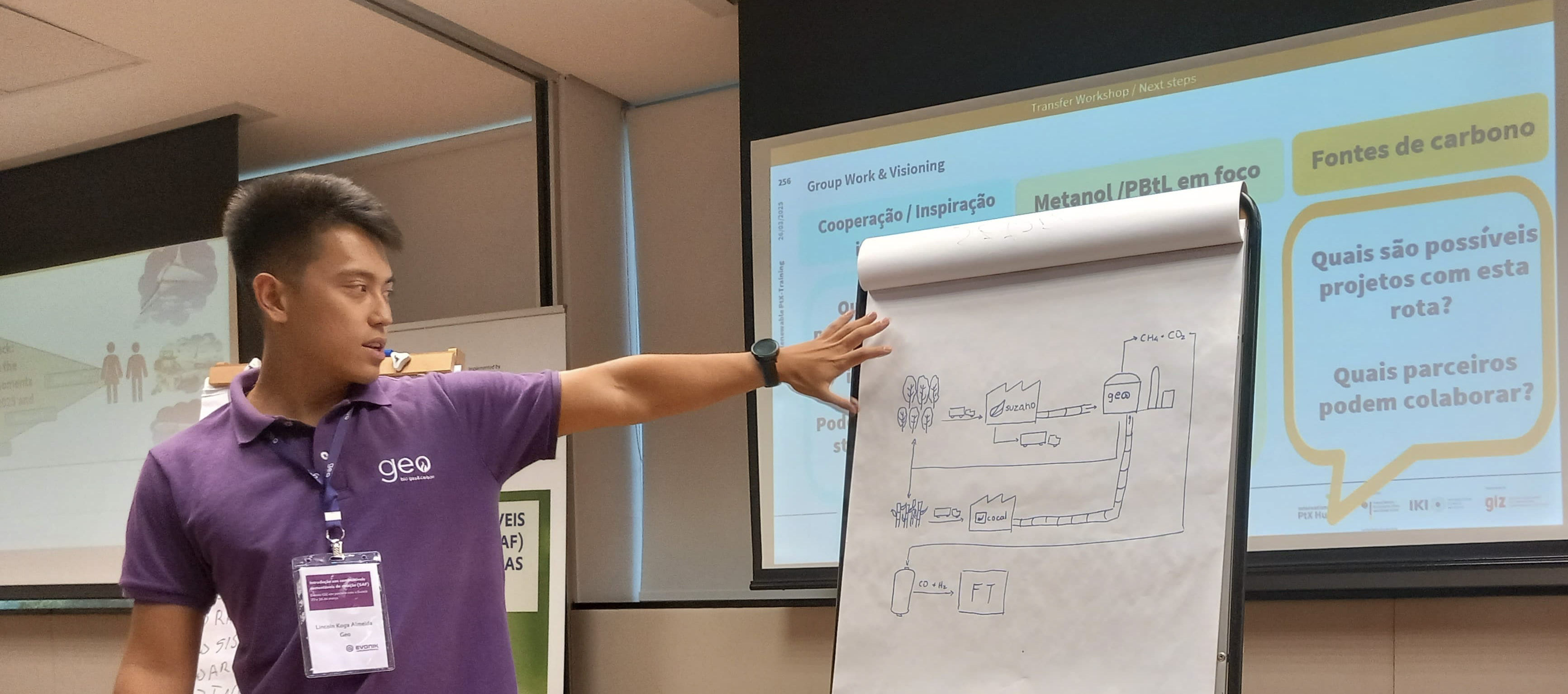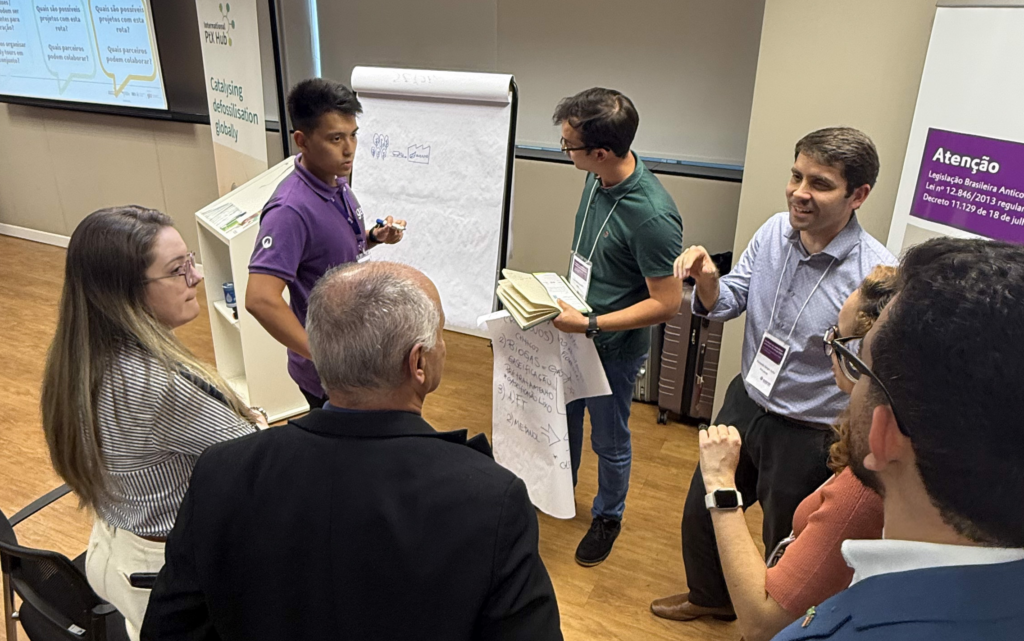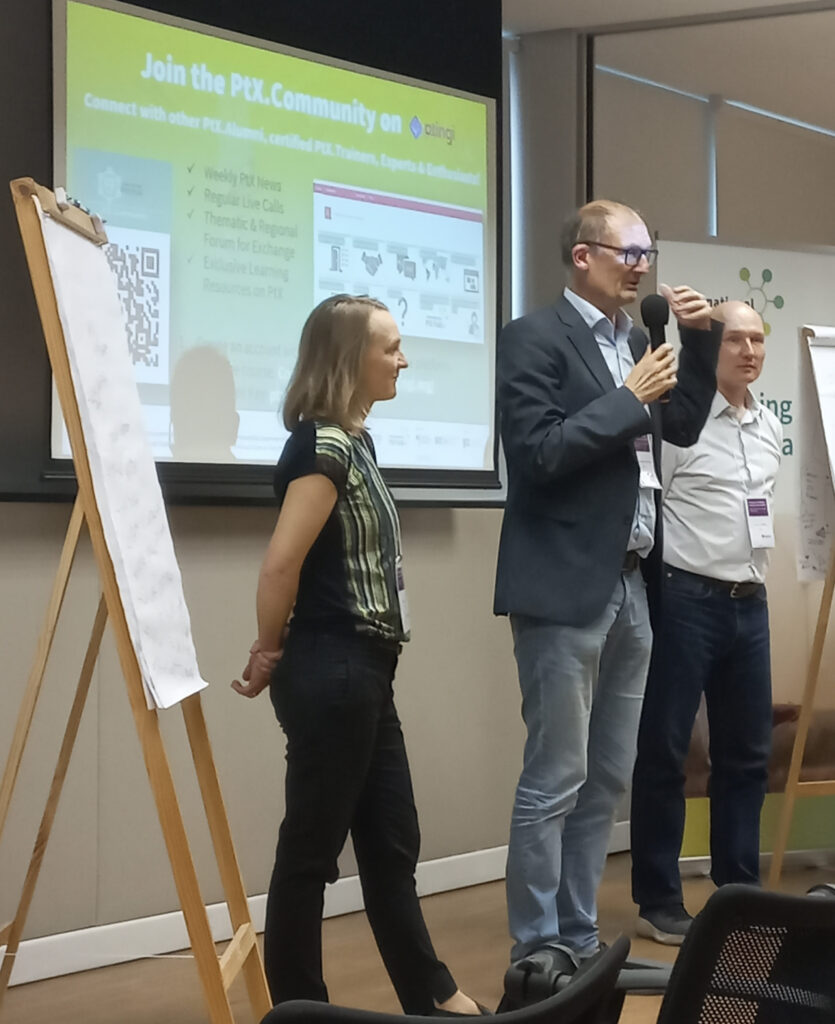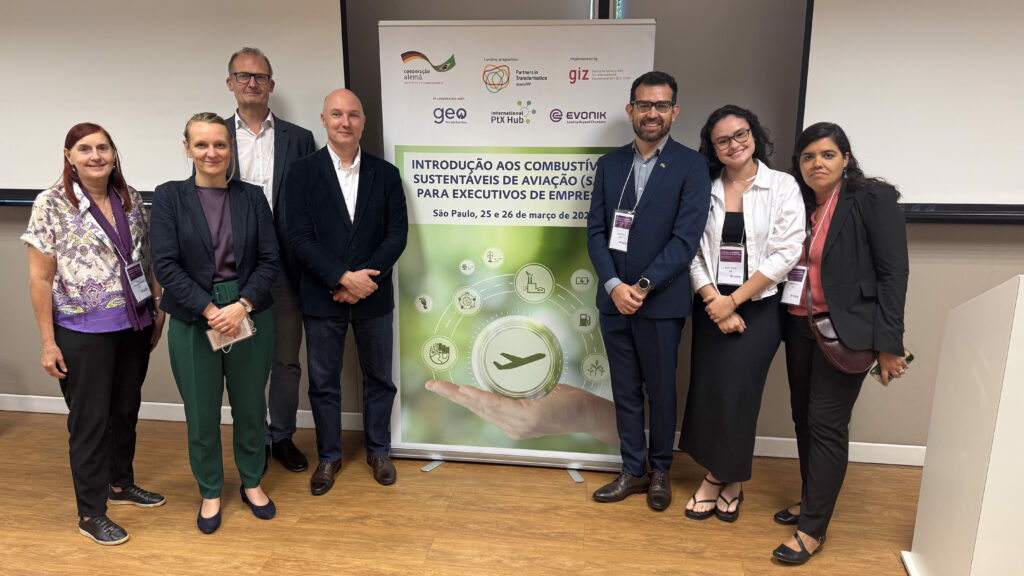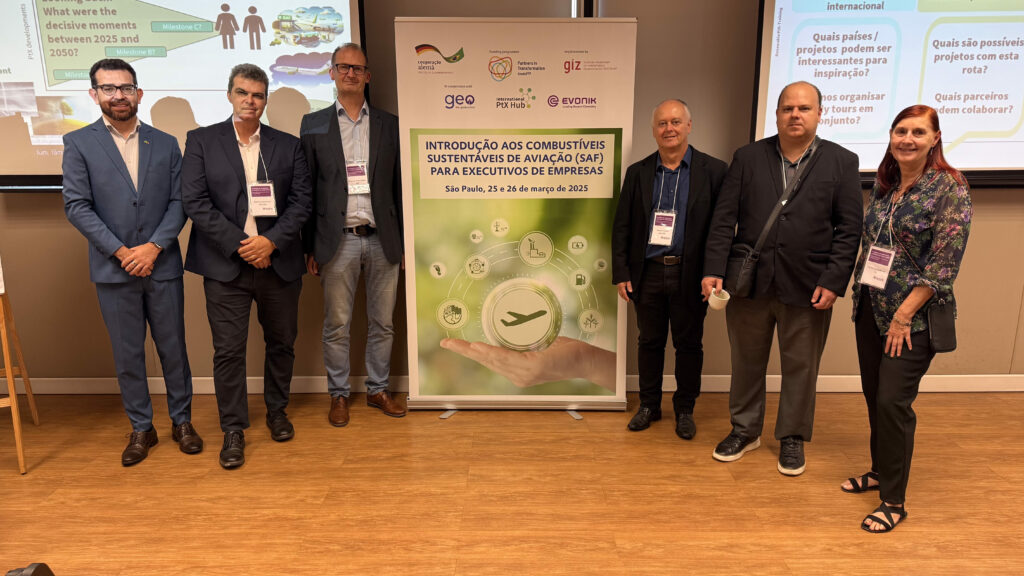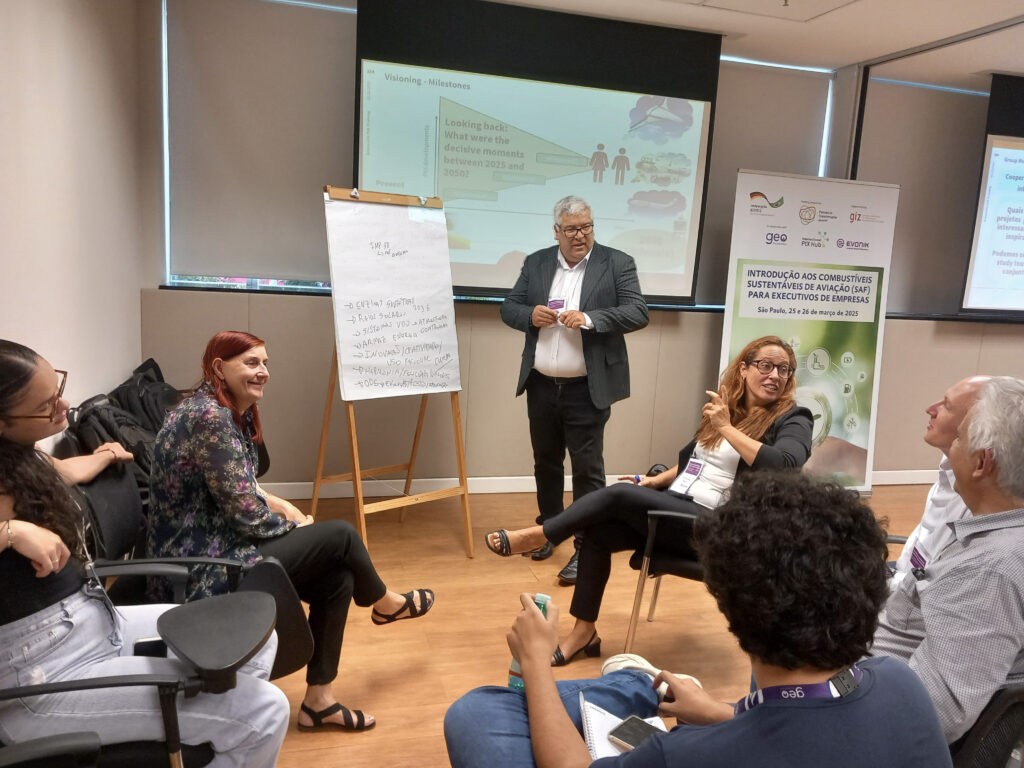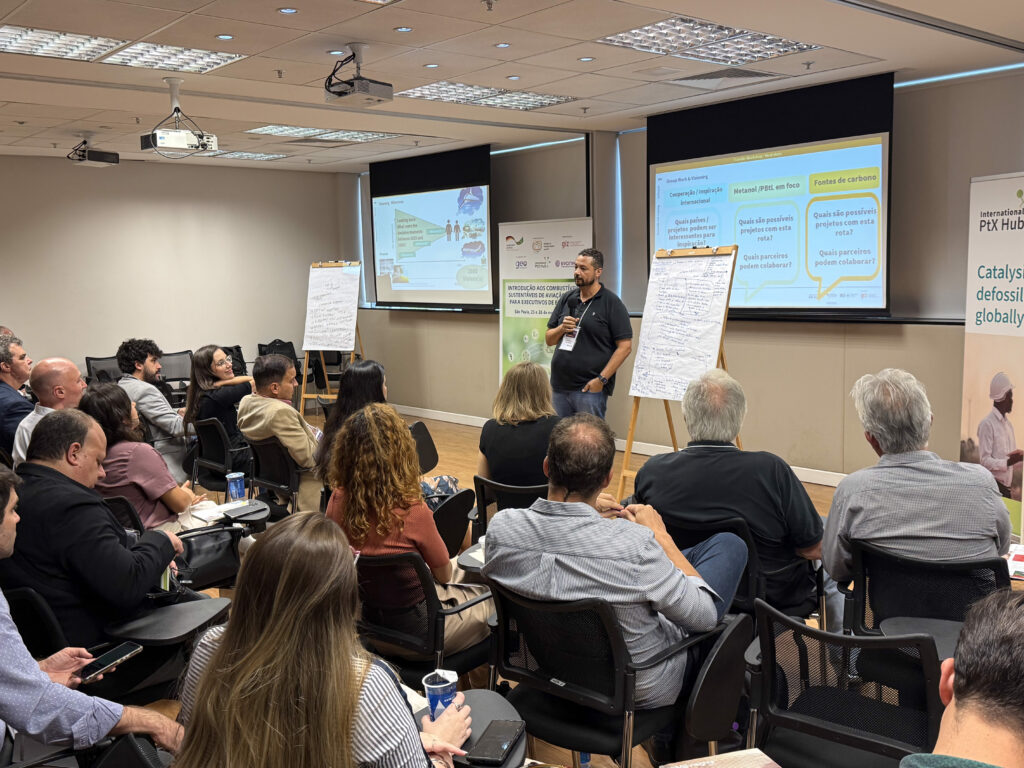Key Insights from a recent SAF training event: On March 25 and 26, São Paulo became the focal point for sustainable aviation innovation as more than 60 executives from various sectors of Brazilian industry, alongside representatives from the Brazilian Development Bank BNDES, participated in the ‘Introduction to Sustainable Aviation Fuels (SAF)’ training course. Conducted by the International PtX Hub, and organized by the Deutsche Gesellschaft für Internationale Zusammenarbeit GmbH (GIZ) in partnership with Evonik and Geo bio gas&carbon, this event highlighted the growing importance of SAF in driving the aviation industry’s defossilisation efforts. The training course was designed to support and strengthen the ecosystem of the SAF sector in Brazil, featuring a comprehensive programme led by Torsten Schwab, Director Technology of the International PtX Hub. Schwab, a prominent expert in sustainable fuels, guided the audience through key aspects of SAF technology, regulatory challenges, and funding opportunities, emphasising how renewable energies can revolutionise the production of sustainable aviation fuels.
Key Highlights of the SAF Training Course
The course covered a wide range of essential topics to provide a well-rounded understanding of the SAF sector:
- Global Overview of SAF: Participants gained insights into the global need for sustainable aviation solutions and the key challenges the industry is facing.
- Technological Routes for SAF Production: A deep dive session delved into various technologies used for SAF production, including HEFASAF, ATJ-SAF, Methanol to SAF, and FTS-SAF (Power-to-Liquid, Biogas-to-Liquid, and Biomass-to-Liquid).
- Certification and Regulation: Participants were introduced to the ASTM criteria and procedures for SAF certification and the international regulations surrounding its use.
- Financing Models and Economic Viability: Representatives from BNDES and GIZ presented financial incentives and support models for SAF projects in Brazil, offering a roadmap for economic sustainability.
- Case Studies and Practical Examples: The event also featured real-world case studies, providing a valuable glimpse into the ongoing initiatives and opportunities in Brazil.
- Interactive Sessions and Networking: Participants engaged in dynamic discussions and networking opportunities, fostering the exchange of ideas and the formation of strategic partnerships.
A Collective Effort for Defossilising Aviation
SAF represents one of the most viable paths towards the ‘de-fossilisation’ of aviation and requires a joint effort by companies, governments, and research institutions to scale its production.
Hendrik Schoenfelder, CEO Evonik Brazil
The assessment of Schoenfelder is more than right: Since most SAFs are still carbon-based – due to the CO2 used for their production – they cannot contribute to decarbonisation, but rather to defossilisation of the industry, that is, the avoidance of fossil feedstock for the new fuels (read more about Defossilising aviation with e-SAF). Schoenfelder noted further, that this event offered a valuable exchange of knowledge and underscored the aviation sector’s growing interest in adopting sustainable solutions. Gustavo Castro, Evonik’s Catalysts Business Manager, added,
Evonik is committed to offering innovative solutions that support the transition to more sustainable energy. We see the SAF market as a great opportunity to drive forward the energy transition by providing catalysts, adsorbents, and membranes that enable the use of renewable raw materials.
Gustavo Castro, Catalysts Business Manager at Evonik
Building Partnerships for the Future
Beyond technical discussions, the event served as a platform for exploring investment opportunities and fostering collaboration to advance SAF production in Brazil. GIZ promotes both public and private sector funded projects in this field. ‘We are proud to support the development of Brazil’s SAF sector,’ stated Dr. Bernd dos Santos Mayer, Coordinator of the Green Hydrogen Innovation Component at GIZ Brazil. He elaborated on the importance of the first SAF project in Brazil, which involves a partnership with Geo bio gas&carbon to create the country’s first commercial-scale plant for Syncrude production from biogas. This sustainable process, utilising biomass waste as a source of biogenic carbon, is a promising solution for SAF production and has the potential to fuel both domestic and international markets. The Fuel for the Future Law further underscores Brazil’s commitment to sustainability by promoting innovation and advancing the energy transition.
This partnership can boost an entire sector, contribute to the sustainability and decarbonisation of aviation, and generate economic growth, jobs, and a just energy transition. We hope this training inspires more companies to pursue SAF production projects across the country.
Dr. Bernd dos Santos Mayer, GIZ
Looking Ahead: The Future of SAF in Brazil
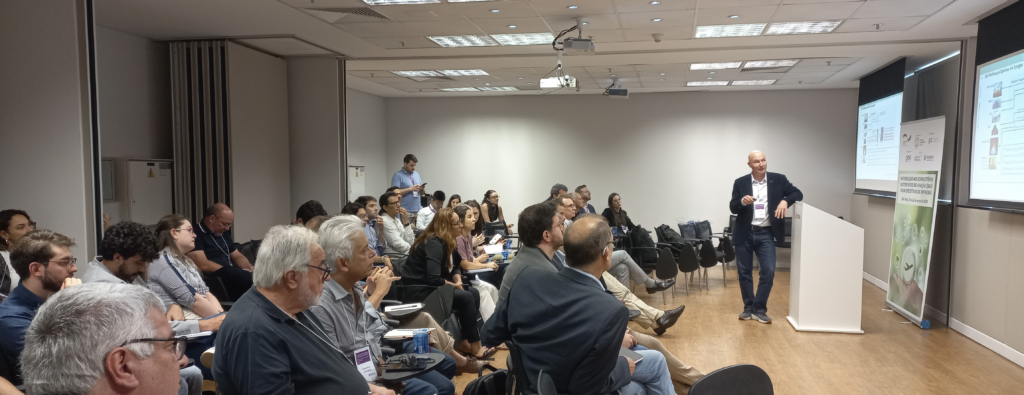
The SAF training course was a significant step toward building a sustainable aviation fuel sector in Brazil. It not only provided valuable insights but also facilitated the creation of vital partnerships that will help shape the future of aviation in the country. Trainer Torsten Schwab:
About ten years ago we started to reflect on SAF for niche scenarios in the remote areas of Brazil. Today we see Brazil at the forefront to contribute to clean aviation globally, being it with SAF or sustainable commodities such as e-methanol, which are becoming urgently needed for various value chains.
Torsten Schwab, Director Technology of the International PtX Hub
As more initiatives take shape and innovative solutions are developed, Brazil is poised to play a leading role in the global transition toward sustainable aviation. As the industry works together to make SAF production more viable on a large scale, the event served as a reminder that collaboration, innovation, and strategic investments are key to achieving a sustainable and decarbonised aviation future.
All photos courtesy of Evonik
